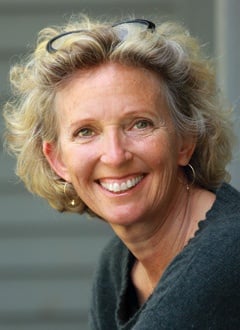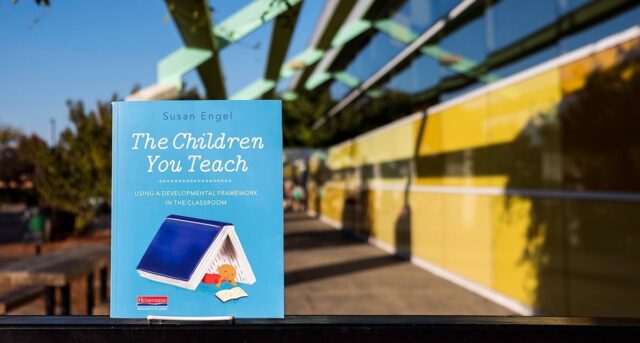
We often underestimate the power of simply thinking differently about children —who they each are and the processes that brought them to this particular point in their lives. But thinking through the particulars about a given child is only a first step.
We often underestimate the power of simply thinking differently about children —who they each are and the processes that brought them to this particular point in their lives. But thinking through the particulars about a given child is only a first step.
Thinking about your students through a developmental lens will enhance your teaching each and every day. It will also make your job more interesting and therefore more fun. You can do this in a general way by getting into a three-step habit:
- Try to notice small things that you hadn’t noticed before—the specific things your students do and say.
- Try to see what story all those small details and brief stretches of behavior are telling you about that particular child (or group of children).
- Place what you’ve noticed or paid attention to within the context of a line of research or strand of developmental psychology that seems most relevant or that will help you make sense of whatever perplexes you about the child or the situation. Don’t rush to decide which aspect of developmental psychology seems relevant. Sometimes it’s not as obvious as it might seem. Let your mind wander a bit as you try to identify which particular strands of psychological development might illuminate the child or teaching puzzle you are thinking about.
…
Whenever possible, as you come up with new activities or plan some curriculum, build on children’s natural inclinations; don’t work against them. For example, rather than find a way to insist or cajole children into sitting still, come up with learning activities that employ their huge need to be active, both physically and mentally.
Children are as quirky as adults. Don’t try to make them all the same. A child who needs time alone, or has one very intense interest, should be helped to use his or her idiosyncrasy, not required over and over again to bypass or suppress it. We don’t want all children to be the same. We want them to be more of who they each are.
Helping children learn or practice specific academic skills can be helpful, and sometimes it’s required for one reason or another. But it’s not the same as helping children develop. Make sure that there are many opportunities for your children to develop new ways of thinking and being in the world. Your classroom is an environment rich with human interaction, which should foster a child’s intellectual and personal growth. Focus on how to make it a good environment for a child’s development. Allow yourself to do a little less and notice a little more.
Watch and listen to your students, and use what you see and hear to think about who they each are and how they are developing. Let those insights guide you as you come up with simple and low-key ways to help them grow.
…
Learn more about The Children You Teach at Heinemann.com
 Follow us on Instagram @heinemannpub to stay up to date on the latest books, your favorite authors, and upcoming events!
Follow us on Instagram @heinemannpub to stay up to date on the latest books, your favorite authors, and upcoming events!
 Susan Engel is a Senior Lecturer in Psychology and Founding Director of the Program in Teaching at Williams College. She currently serves as the Williams College Gaudino Scholar, a position that creates and promotes opportunities for students to stretch beyond what they are familiar with. She has taught all ages from three year olds through college. Her research interests include the development of curiosity, children’s narratives, play, and more generally, teaching and learning. Her current research looks at the development of children’s ideas. Her scholarly work has appeared in journals such as Cognitive Development, Harvard Educational Review, and the American Education Research Journal.
Susan Engel is a Senior Lecturer in Psychology and Founding Director of the Program in Teaching at Williams College. She currently serves as the Williams College Gaudino Scholar, a position that creates and promotes opportunities for students to stretch beyond what they are familiar with. She has taught all ages from three year olds through college. Her research interests include the development of curiosity, children’s narratives, play, and more generally, teaching and learning. Her current research looks at the development of children’s ideas. Her scholarly work has appeared in journals such as Cognitive Development, Harvard Educational Review, and the American Education Research Journal.
She is the author of seven previous books: The Stories Children Tell: Making Sense of the Narratives of Childhood, Context is Everything: The Nature of Memory, Real Kids: Making Sense in Everyday Life, Red Flags or Red Herrings: Predicting Who Your Child Will Become, The Hungry Mind: The Origins of Curiosity in Childhood, The End of the Rainbow: How Educating for Happiness (Not Money) Would Transform Our Schools, and most recently, A School of Our Own: The Story of the First Student-Run High School, and a New Vision for American Education which she co-wrote with her son Sam. Her writing on education has appeared in The New York Times, The Nation, The Atlantic Monthly, Salon, The Huffington Post, and The Boston Globe.
Susan is one of the founders of an experimental school in New York State, where she served as educational advisor for eighteen years. She lives in New Marlborough, Massachusetts with her husband Tom Levin. They have three sons, Jake, Will, and Sam.
Related Reading

Motivation is as much a process as it is a feeling. - Susan Engel

